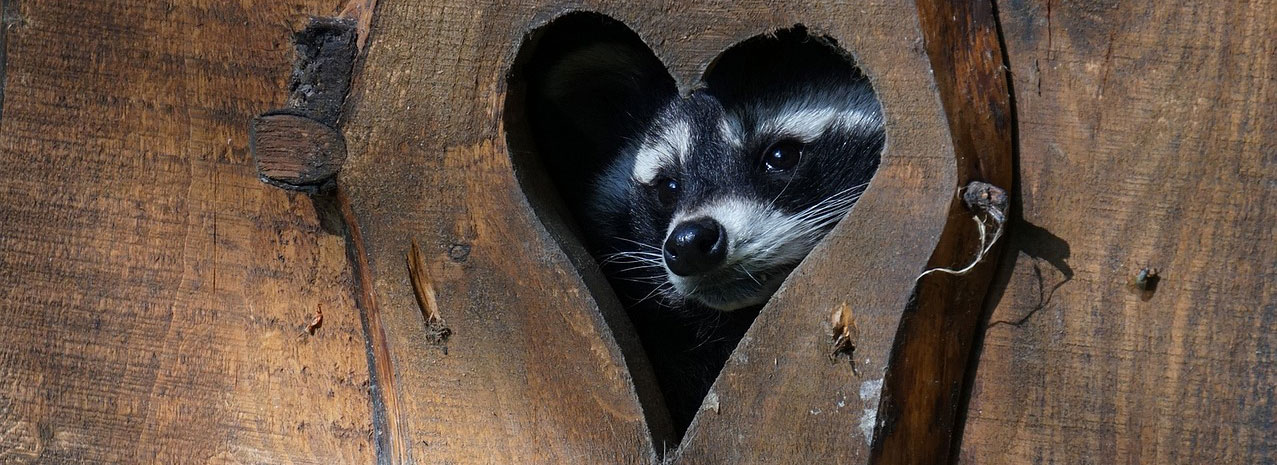Do you often hear raccoon sounds coming from your attic at night? You're not alone; many homeowners are surprised to find unexpected guests lurking in their homes during the winter. Raccoons are sly and intelligent creatures that can easily gain access to your home through gaps or holes in your roof, chimney, foundation, or siding and make a home in your attic during the colder months. While raccoons do not “hibernate” all season, they do settle in for a long rest where they feel secure from any predators or from being disturbed.

So, what should you do if you have raccoons occupying your attic during the winter months? In this blog post, we'll explore the best methods to remove them from your attic and provide some advice on how to prevent it from happening again.
Why Do Raccoons Prefer Attics?
Why do some people find raccoons in their attic during the winter? The answer is simple: they need a place to keep warm, have shelter, and to rest, much like many other wildlife. Raccoons are opportunistic animals and will seek out any available shelter that can provide safety and warmth. Attics, being largely unused spaces, provide a perfect cover for raccoons to make a home and avoid predators.
Using their sharp teeth and claws, raccoons can gain access to an attic through weak pressure points of a wall, the shingles, or through a small gap of a corner or air vent. Once inside an attic, a raccoon can create a comfy bed with insulation and/or stored blankets or clothing.
In addition, attics provide easy access to food by way of trash cans or nearby gardens. Since raccoons are excellent climbers, they also tend to look for high points to live.
What Do Raccoons Usually Do During the Winter?
As temperatures begin to drop, raccoons begin growing thicker coats of fur, building up body fat, devouring any and all food they find. They also begin looking for a place to call “home” for their winter sleep.
Raccoons mimic bears and go into a state known as torpor to conserve energy levels, maintain fat cells, and keep warm during the cold temperatures of Canadian winters. This is a mild version of the hibernation state in which an animal’s heart, respiratory, and metabolic rates drop to survive the decrease in temperature and lack of available food sources. Raccoons often enter the torpor state once outside temperatures fall below minus 10 degrees Celsius.
It is important to understand that while torpor can usually last up to one month for raccoons, they do stir during the warmer times of the winter to seek food. Torpor allows raccoons to be alert enough if a predator is in the vicinity and/or if a food source is nearby. It is during the first couple months of a new year when raccoons are more noticeable as they begin the search for mates and food sources.
Tips and Precautions for Raccoon Prevention During the Winter
No one wants to find raccoons living in their attic. Not only can they cause damage to your home, but they can also pose serious health risks. Raccoons carry diseases such as rabies and can contaminate your home with raccoon poop.
Getting rid of raccoons from your attic in the winter can prevent these problems from occurring. Below, we list several precautions you can take during the fall and winter months to protect your attic from becoming home to pesky raccoons.
Remove Food Sources
Discourage visiting raccoons from returning and/or making a home in your attic by removing all nearby food sources. Take preventative measures to secure garbage cans, remove pet bowls from outside, and take down bird feeders.
Seal Up Entry Points
Deter access to the attic by sealing any and all entry points near/on the roof. Repair any missing shingles, use protective screens on vents as raccoon repellent, and reinforce the matting near drain plunges and chimneys to make it harder for raccoons to gain access to your home.
Trim Trees and Shrubs Away from Your House
Since raccoons are intelligent and resourceful creatures, trim tree branches away from the roof of your house that can give them easy access to the attic area. Shrubs near a doorway should also be trimmed as a raccoon can hide in the bushes and wait for the right moment to dash into the home when a door is left opened.
Check Your Attic Regularly
Regularly inspecting your attic and roof will help you determine if a raccoon(s) has settled into your attic. Look for any holes or gaps in the corners of your attic that may have recently been made that would enable a raccoon to gain access to your attic. Note any strange odours, look for raccoon poop or urine, and listen for raccoon sounds that may indicate a raccoon has made a home in your attic. In addition, check for any signs of missing insulation that may have been used as a bed.
Contact a Professional
For safe and effective raccoon removal, contact a professional wildlife trapper. They will have the knowledge of raccoon behaviours, the equipment, and the proper techniques to use in order to permanently remove a raccoon from your attic.
Hire Hawkeye, A Leading Expert in Wildlife Removal & Control
For more than 35 years, Hawkeye Bird and Animal Control has been providing permanent raccoon removal for residential, commercial, and industrial properties in the GTA.
We are the only pest bird and animal/wildlife control company in Canada to be designated "Certified Wildlife Control Professional" AND hold the following licenses: Trapping of Fur Bearing Animals Permit, Falconry Permit, and Pest Control License. As a result, we guarantee permanent results. Contact us at (416) 429-5393 or email [email protected].














